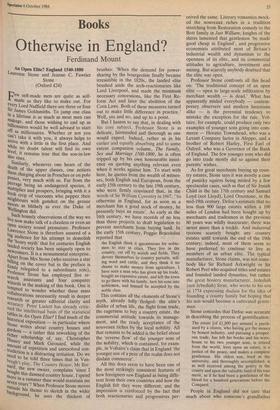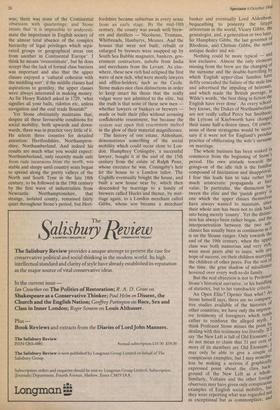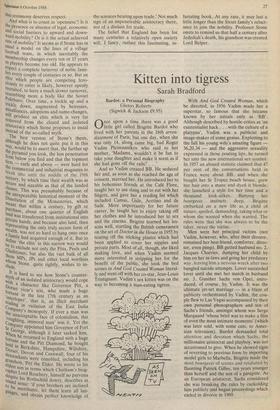Books
Otherwise in England?
Ferdinand Mount
Laurence Stone and Jeanne C. Fawtier Stone An Open Elite? England 1540-1880 (Oxford £24)
Few self-made men are quite as self- made as they like to make out. For every Lord Nuffield there are three or four Sir James Goldsmiths. To jump one class in a lifetime is as much as most men can manage, and those wishing to end up as billionaires would be well advised to start off as millionaires. Whether or not you can't take it with you, it always helps to arrive with a little in the first place. And While no doubt talent will find its own level, it remains true that the son-in-law also rises.
Similarly, whenever one hears of the death of the upper classes, one notices them charging about in Porsches or on polo Ponies, very much with us. Far from the Peerage being an endangered species, it multiplies and prospers, bringing with it a fresh crop of viscounts who pepper their neighbours with gunshot on the grouse moors as blithely as ever the Duke of Wellington did. Such homely observations of the way we live now make talk of a classless or even an °Pen society sound premature. Professor Lawrence Stone is therefore assured of a big audience for his attempt to demolish the 'hoary myth' that for centuries English landed society has been uniquely open to newcomers. It is a monumental enterprise. Apart from Mrs Stone (who receives a star billing on the cover but in the preface is firmly relegated to a subordinate role), Professor Stone has employed five re- search assistants and four computer wizards in the making of this book. One is tempted to wonder whether these mass collaborations necessarily result in deeper research or greater editorial clarity and accuracy Peter Laslett has already critic- ised the intellectual basis of the statistical tables in An Open Elite? I find much of the Stone exposition — in particular where Stone writes about country houses and gardens — a rather thin reworking of the richer scholarship of, say, Christopher Hussey and Mark Girouard, while the amount of repetition and unresolved con- . tradiction is a distracting irritation. Do we need to be told three times that in Van- °nigh's play, The Country House, Mr Bar- nard, the new owner, complains 'since I uptight this damned country house, I spend More in a summer than would maintain me seven years'? When Professor Stone moves 9utside his theme to sketch in the wider background, he uses the thickest of
brushes: 'When the demand for power- sharing by the bourgeoisie finally became irresistible in the 1820s, the landed elite brushed aside the arch-reactionaries like Lord Liverpool, and made the minimum necessary concessions, like the First Re- form Act and later the abolition of the Corn Laws. Both of these measures turned out to make little difference in practice.' Well, yes and no, and up to a point.
But I hasten to say that, in dealing with his core subject, Professor Stone is as delicate, fairminded and thorough as one would expect. Indeed, rather as in his earlier and equally absorbing and to some extent companion volume, The Family, Sex and Marriage 1500-1800, he is often tripped up by his own honourable insist- ence on quoting anything relevant even when it works against him. To start with here, he quotes from the wealth of witnes- ses, both English and European, from the early 15th century to the late 19th century, who were firmly convinced that, in the words of Sir William Coventry in 1667, "tis otherwise in England, for as soon as a merchant has a good stock of money, he presently buys an estate'. As early as the 16th century, we have records of no less than three projects to draft legislation to prevent merchants from buying land. In the early 15th century, Poggio Bracciolini reported that
the English think it ignominious for noble- men to stay in cities. They live in the country, cut off by woods and fields. They devote themselves to country pursuits, sell- ing wool and cattle, and they think it no shame to make money from agriculture. I have seen a man who has given up his trade, bought an expensive estate, and left the town to go there with his family, turn his sons into noblemen, and himself be accepted by the noble class.
This contains all the elements of Stone's myth, already fully fledged: the elite's dislike of urban life, the flight from trade, the eagerness to buy a country estate, the commercial attitude towards its manage- ment, and the ready acceptance of the nouveaux riches by the local nobility. All that remains to be added is the belief about the 'reverse flow' of the younger sons of the nobility, which is contained, for exam- ple, in Voltaire's claim that in England 'the younger son of a peer of the realm does not disdain commerce'.
All this does seem to have been one of the most strikingly consistent features of how foreigners saw England as being diffe- rent from their own countries and how the English felt they were different; and the impression is reinforced by the fact that both reactionaries and progressives per- ceived the same. Literary romantics mock- ed the nouveaux riches in a tradition stretching from Restoration comedy to the Bott family in Just William; knights of the shires lamented that gentlemen 'be made good cheap in England'; and progressive economists attributed most of Britain's industrial wealth and dynamism to the openness of its elite, and its commercial attitudes to agriculture, investment and mining. But scarcely anybody doubted that the elite was open.
Professor Stone confronts all this head on: 'The traditional concept of an open elite — open to large-scale infiltration by merchant wealth — is dead.' What has apparently misled everybody — contem- porary observers and modern historians alike — is the perennial tendency to mistake the exception for the rule. Vol- taire, for example, could produce only two examples of younger sons going into com- merce — Horatio Townshend, who was a Levant Company factor in Aleppo, and a brother of Robert Harley, First Earl of Oxford, who was a Governor of the Bank of England. The few younger sons who did go into trade mostly did so against their parents' wishes.
As for great merchants buying up coun- try estates, Stone says it was mostly a case of panicky squires being misled by a few spectacular cases, such as that of Sir Josiah Child in the late 17th century and Samuel Loyd (not Lloyd), Lord Overstone, in the mid-19th century. Defoe's estimate that no less than 900 large estates within a 100 miles of London had been bought up by merchants and tradesmen in the previous 80 years was wildly inaccurate; there was
never more than a trickle. And industrial
tycoons scarcely bought any country estates until towards the end of the 19th century; indeed, most of them seem to have preferred to continue to live as members of an urban elite. The typical manufacturer, Stone claims, was not some- body like Sir Richard Arkwright or Sir Robert Peel who acquired titles and estates and founded landed dynasties, but rather the great hosiery manufacturer, Jedediah (not Jebediah) Strut, who wrote to his son in 1774 expressing disdain for the idea of founding a county family but hoping that his son would become a cultivated gentle- man.
Stone concedes that Defoe was accurate in describing the process of gentrification: The estate [of £1,800 per annum] is purch-
ased by a citizen, who having got the money by honest industry, and pursuing a prosper- ous trade, has left his books and his ware- house to his two younger sons, is retired from the world, lives upon an estate, is a justice of the peace, and makes a complete gentleman. His eldest son, bred at the university, and thoroughly accomplished, is as well received among the gentry in the county and upon the valuable fund of his true merit, as if he had been a gentleman of the blood for a hundred generations before the Conquest.
People in England did not care that much about who someone's grandfather was; there was none of the Continental obsession with quarterings; and Stone insists that 'it is impossible to underesti- mate the importance in English society of the almost total absence of the complex hierarchy of legal privileges which sepa- rated groups or geographical areas one from another in Continental Europe'. I think he means 'overestimate', but he does accept that the lack of formal class barriers was important and also that the upper classes enjoyed a 'cultural cohesion with the middling sort'; if the middle classes had aspirations to gentility, the upper classes were always interested in making money. As Sir Henry Riddell asked in 1729, 'what signifies all your balls, ridottos etc, unless navigation and the coal trade flourish?'
Yet Stone obstinately maintains that, despite all these favourable conditions for social mobility, both upwards and down- wards, there was in practice very little of it. He selects three counties for detailed attention: Hertfordshire, Northampton- shire, Northumberland. And indeed his results are much what you would expect: Northumberland, only recently made safe from rude incursions from the north, was stable and sleepy until country seats began to spread along the pretty valleys of the North and South Tyne in the late 18th century, to be followed in the 19th century by the first wave of industrialists from Newcastle. Northamptonshire, that strange, isolated county, remained fairly quiet throughout Stone's period, but Hert- fordshire became suburban in every sense from an early stage. By the mid-18th century, the county was awash with brew- ers and distillers — Nicolsons, Trumans, Whitbreads, Hanburys, Meuxes. And the houses that were not built, rebuilt or enlarged by brewers were snapped up by South Sea Bubble magnates, bankers, gov- ernment contractors, nabobs from India and merchants from the Levant. As else- where, these new rich had eclipsed the first wave of new rich, who were mostly lawyers and office-holders, such as the Cecils. Stone makes nice class distinctions in order to keep intact his thesis that the really vulgar were not admitted to the elite, but the truth is that none of these new men — whether lawyers or bankers or brewers — made or built their piles without arousing congiderable resentment, but because the system was open that resentment melted in the glow of their material magnificence.
The history of one estate, Aldenham, demonstrates something of the social mobility which could occur close to Lon- don. Humphrey Coningsby, a successful lawyer, bought it at the end of the 15th century from the estate of Ralph Penn, whose executor he was. Coningsby's heir let the house to a London tailor. The Coghills eventually bought the house, and built a new house near by, which then descended by marriage to a family of brewers called Hucks and thence, by mar- riage again, to a London merchant called Gibbs, whose son became a merchant' banker and eventually Lord Aldenham, bequeathing to posterity the largest arboretum in the world, Vicary Gibbs, the genealogist, and, a generation or two later, Sir Humphrey Gibbs, the last governor of Rhodesia, and Chrissie Gibbs, the noted antique dealer and wit. Nothing could be more typical — and less exclusive. Almost the only elements missing from the brew are the changing of the surname and the double-barrelling by which English upper-class families have deftly concealed the failure of the male line and advertised the impaling of heiresseS, and which made the British peerage, In Wilde's words, 'the best thing in fiction the English have ever done'. As every school- boy knows, the Dukes of Northumberland are not really called Percy but Smithson; the Lyttons of Knebworth have changed their name half-a-dozen times. Of course, none of these stratagems would be neces- sary if it were not for England's peculiar practice of obliterating the wife's surname on marriage. The whole business has been soaked i,11 commerce from the beginning of Stone s period. His own attitude towards the goings-on of the idle rich is the familiar compound of fascination and disapproval' I fear this leads him to take rather toe much aristocratic propaganda at face value. In particular, the distinction he' tween the elite and the 'parish gentry is one which the upper classes themselves have always wanted to maintain, sine! their whole aim has been not to sink back into being merely 'county'. Yet the distinc- tion has always been rather bogus, and the interpenetration between the two sub" classes has usually been as continuous as It is on the Sloane ranges. Only towards the end of the 19th century, when the upPer class was both numerous and very rich, were most peers able to insist, with allY hope of success, on their children marrying the children of other peers. For the rest °f the time, the grim shadow of misalliance hovered over every well-to-do family. But the real objection is not to Professor Stone's historical narrative, or his handling of statistics, but to his ramshackle criteria. An Open Elite? Opener than what? As Stone himself says, there are no compara; tive studies available of the histories .0' other countries; we have only the impress- ive testimony of foreigners which tends rather to reinforce the alleged myth. I think Professor Stone misses the point bY dealing with this testimony too literally. 1,f say 'the New Left is full of Old Etonians do not mean to claim that 51 per cent or, more of its members are Old Etonians; may only be able to give a couple 01 conspicuous examples; but I may nonethe- less be making a serious if graphic)' expressed point about the class back- ground of the New Left as a Whole' Similarly, Voltaire and the other foreign observers may have given only conspicuous examples of English social mobility, but they were reporting what was regarded no! as exceptional but as commonplace, an this testimony deserves respect.
And what is to count as 'openness'? Is it the presence or absence of legal, economic and social barriers to upward and down- ward mobility? Or is it the actual achieved rate of mobility? It seems as if Stone has in mind a model on the lines of a village football team, in which inevitably the membership changes every ten or 15 years as players become too old. He appears to e fami- lies a complete turnover of noble fam-
lies every couple of centuries or so. But an elite which people are competing fero- ciously to enter is likely, however openly recruited, to have a much slower turnover, resembling more a body like the Soviet Politburo. Over time, a trickle up and a trickle down, augmented by heiresses, misalliances, adoptions and name-changes, Will produce an elite which is very far removed from the closed and isolated aristocracy which Stone proposes to instal instead of the so-called myth. The best version of Stone's thesis, although he does not quite put it in this Wray, would be to assert that, the further up !fie Pyramid you look, the less penetration from below you find and that the topmost tiers earls and above — were hard for the commercial and industrial magnates to break into until the middle of the 19th century, by which time their wealth was as secure and sizeable as that of the landed classes. This was presumably because of the unrepeatable historical moment of the bissolution of the Monasteries, which meant that within a century, by gift or Purchase, about one quarter of English 'att.(' was transferred from institutional into Private hands; and because also land, then representing the only truly secure form of Wealth, was not so hard to hang onto once
family had acquired enough of it. But to
be 'the elite' in this narrow way would ne to exclude not only the Pitts, Peels and Gladstones, but also the vast bulk of all those MPs, JPs and other local worthies Whom Stone, quite rightly, wishes to in- clude.
It is hard to see how Stone's counter- myth of an isolated aristocracy would cope w_lth a character like Governor Pitt, a yorset vicar's son, who made a huge fortune in the late 17th century as an interloper', that is, an illicit merchant trading in violation of the East India ,L,Mripany's monopoly. If ever a man was ,Lne unacceptable face of colonialism, this ,..,mughling, immoral man' was it. Yet the Mnpany appointed him Governor of Fort George, although it later sacked him. When he returned to England with a huge _fortune and the Pitt Diamond, he bought _land in Berkshire, Hampshire, Wiltshire, b. orset, Devon and Cornwall; four of his descendants were ennobled, including his grandson, Pitt the Elder. He wrote to his
eldest son in terms which Chatham's biog- rapherr -
aPher Lord Rosebery, himself no parvenu as espite his Rothschild dowry, describes as :Mind sense: 'if your brothers are inclined to be merchants, let them learn all lan- guages, and obtain perfect knowledge of
the sciences bearing upon trade.' Not much sign of an impenetrable aristocracy there, nor of a disdain for trade.
The belief that England has been for many centuries a relatively open society will, I fancy, outlast this fascinating, in- furiating book. At any rate, it may last a little longer than the Strutt family's reluct- ance to join the nobility. Professor Stone omits to remind us that half a century after Jedediah's death, his grandson was created Lord Belper.
















































 Previous page
Previous page